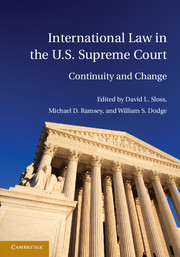Book contents
- Frontmatter
- Contents
- List of Contributors
- Table of Cases
- Acknowledgments
- Introduction
- PART I FROM THE FOUNDING TO THE CIVIL WAR
- PART II FROM THE CIVIL WAR TO THE TURN OF THE CENTURY
- PART III FROM THE TURN OF THE CENTURY TO WORLD WAR II
- PART IV FROM WORLD WAR II TO THE NEW MILLENNIUM
- PART V INTERNATIONAL LAW IN THE U.S. SUPREME COURT IN THE TWENTY-FIRST CENTURY
- V.A TREATIES AFTER 2000
- V.B CUSTOMARY INTERNATIONAL LAW AFTER 2000
- V.C INTERNATIONAL LAW AND CONSTITUTIONAL INTERPRETATION AFTER 2000
- V.D INTERNATIONAL LAW AND STATUTORY INTERPRETATION AFTER 2000
- V.E INTERNATIONAL LAW AND THE WAR ON TERROR
- VI CONCLUSION
- Index
Introduction
Published online by Cambridge University Press: 05 July 2011
- Frontmatter
- Contents
- List of Contributors
- Table of Cases
- Acknowledgments
- Introduction
- PART I FROM THE FOUNDING TO THE CIVIL WAR
- PART II FROM THE CIVIL WAR TO THE TURN OF THE CENTURY
- PART III FROM THE TURN OF THE CENTURY TO WORLD WAR II
- PART IV FROM WORLD WAR II TO THE NEW MILLENNIUM
- PART V INTERNATIONAL LAW IN THE U.S. SUPREME COURT IN THE TWENTY-FIRST CENTURY
- V.A TREATIES AFTER 2000
- V.B CUSTOMARY INTERNATIONAL LAW AFTER 2000
- V.C INTERNATIONAL LAW AND CONSTITUTIONAL INTERPRETATION AFTER 2000
- V.D INTERNATIONAL LAW AND STATUTORY INTERPRETATION AFTER 2000
- V.E INTERNATIONAL LAW AND THE WAR ON TERROR
- VI CONCLUSION
- Index
Summary
Introduction
The twenty-first century's first decade was an extraordinarily active one for international law in the Supreme Court, with the Court issuing more than thirty decisions implicating international law. Many of these decisions came in high-profile cases, and many made important contributions to the Court's jurisprudence. In Sanchez-Llamas v. Oregon and Medellin v. Texas, the Court considered the domestic legal status of treaties and the domestic effects of decisions by the International Court of Justice. It considered the federal judiciary's role in applying customary international law under the Alien Tort Statute in Sosa v. Alvarez-Machain. In a series of cases including Lawrence v. Texas, Roper v. Simmons, and Graham v. Florida, it turned in part to international law and foreign practice to decide the scope of domestic constitutional rights. In F. Hoffman-La Roche Ltd. v. Empagran S.A., Morrison v. National Australia Bank Ltd., and other cases, it used principles originally rooted in international law to constrain the global reach of federal statutes. And in prominent cases arising in the aftermath of the September 11, 2001 terrorist attacks, the Court grappled with questions of individual rights and separation of powers in a new kind of international warfare.
Many of these decisions were deeply controversial, provoking strong dissents from Justices not in the majority and strong criticism from academic and political commentators. Critics and supporters often differed sharply as to whether the Court's decisions were faithful to or a radical departure from prior precedents.
- Type
- Chapter
- Information
- International Law in the U.S. Supreme Court , pp. 1 - 4Publisher: Cambridge University PressPrint publication year: 2011

